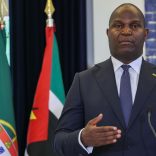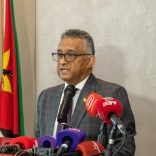Mozambique: Public debt reaches 1,100 billion meticais - AIM
Banco da África Ocidental expects extraordinary growth in Mozambique after turbulence

The president of Banco da Africa Ocidental (BAO) yesterday said he felt that “things are changing in Mozambique”, and that “an extraordinary time” will follow the current period of turbulence.
“We are in a time of turbulence, which is what we are living now and for two or more months, but then it will be an extraordinary time for Mozambique,” Diogo Lacerda Machado said.
Speaking to journalists on the sidelines of the conference on Portuguese-speaking Africa dedicated to Guinea-Bissau in Lisbon yesterday, the banker emphasised, in relation to the investigations into Mozambique’s hidden loans, that what results from these reports and the examination of what happened would be “one of the determinants of this change”.
According to non-executive vice-president of Banco Mais, “Mozambicans will be able to make the differentiations that have to be made, and certainly also the international partners will too, and they will understand that all that will be known is to be known and appreciated in the terms resulting from the reports, and that then the Mozambican authorities will eventually come to the conclusions they have to draw in the exercise of their duties and powers”.
This, he continued, “is one of the signs of change on the way to an extraordinary period of growth well above the Mozambican average, and in marked contrast to the last three or four years in Mozambique”.
Diogo Lacerda said that Banco Mais, former Banco Tchuma, was not exposed to Mozambique’s public debt and did not hold any stake in the hidden loans.
The hidden debts involve loans contracted by ProIndicus, Mozambique Asset Management (MAM) and Empresa Moçambicana de Atum (EMATUM) and guaranteed by the Mozambican government in 2013 and 2014 to the value of US$1.4 billion, plus another US$727.5 million resulting from the issuing of sovereign debt securities to cover corporate bonds issued by Ematum.
The loans were approved without the knowledge of the Assembly of the Republic and international donors. The discovery of debt led the International Monetary Fund and major international donors to suspend aid to the country, subject to an independent international audit.
In January, the Mozambican state opted not to pay the yearly US$60 million instalment on the US$727.5 million sovereign debt issued in April last year. In March, Proindicus failed to pay a US$119.2 million repayment on its US$622 million loan, causing Mozambique to fall into financial default again.
Renegotiations are scheduled for after the completion of the ongoing independent international audit.













Leave a Reply
Be the First to Comment!
You must be logged in to post a comment.
You must be logged in to post a comment.